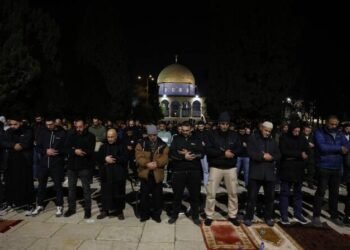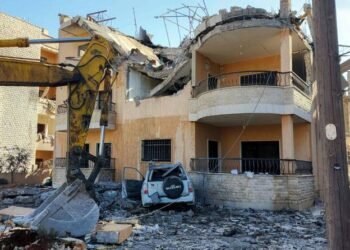UNITED NATIONS, US: The health care system in the Gaza Strip is “on its knees,” the head of the World Health Organization warned Friday, noting that half of the territory’s 36 hospitals are no longer functioning.
Speaking to the Security Council, Tedros Adhanom Ghebreyesus described the situation on the ground as desperate: “Hospital corridors crammed with the injured, the sick, the dying; morgues overflowing; surgery without anesthesia; tens of thousands of displaced people sheltering at hospitals.”
“The health system is on its knees, and yet somehow is continuing to deliver lifesaving care,” he said.
Tedros said there had been more than 250 attacks on health care — such as strikes on hospitals, clinics, ambulances and patients — in Gaza and the West Bank, and 25 such attacks in Israel in the conflict triggered by Hamas’s shock October 7 assault.
“The best way to support those health workers and the people they serve is by giving them the tools they need to deliver that care — medicines, medical equipment and fuel for hospital generators,” he said, calling for an increase in aid trickling in through the Rafah crossing with Egypt and repeating the UN’s call for a cease-fire.
“I understand what the children of Gaza must be going through, because as a child, I went through the same thing,” said the WHO chief, who is from Ethiopia’s Tigray region.
“The sound of gunfire and shells whistling through the air; the smell of smoke after they struck; tracer bullets in the night sky; the fear; the pain; the loss — these things have stayed with me throughout my life.”
He also denounced the “horrific, barbaric and unjustifiable attacks” carried out by Hamas fighters, and demanded the release of hostages held by the militant group.
The head of the Palestinian Red Crescent Society, Marwan Jilani, addressed the Security Council by video, calling on members to “do all you can to spare further deaths and sufferings.” The council is divided on the war and has failed to issue a resolution on it.
He highlighted the dire situation at the Al-Quds hospital in Gaza City, which the Red Crescent said was fired on Friday by Israeli snipers.
“Our utmost concern is the direct threat to the lives of all those wounded and sick, together with tens of thousands of civilians, including thousands of children,” Jilani said.
“They are looking at you, imploring you to act to stop another possible massacre unfolding.”
The Security Council started its meeting with a minute of silence to honor the victims of the Hamas assault, the civilians killed in Israel’s retaliatory strikes on Gaza, as well as the journalists and UN personnel who have died in the war.
The International Committee of the Red Cross said that its teams in recent days had distributed critical supplies to medical structures across Gaza, and had seen “horrendous images that have now gotten worse due to sharpened hostilities.”
This was severely affecting hospitals and ambulances and taking a heavy toll on civilians, patients, and medical staff, it said in a statement.
“Overstretched, running on thin supplies and increasingly unsafe, the health care system in Gaza has reached a point of no return.”
Medical facilities and personnel across Gaza have repeatedly come under attack since Israel’s war with Hamas erupted just over a month ago.
Such attacks have dealt “a heavy blow to the health care system in Gaza, which is severely weakened after more than one month of heavy fighting,” ICRC said.
“The destruction affecting hospitals in Gaza is becoming unbearable and needs to stop,” William Schomburg, head of the ICRC sub-delegation in Gaza, said in Friday’s statement.
“The lives of thousands of civilians, patients and medical staff are at risk.”
The ICRC pointed out that children’s hospitals had not been spared from the violence, including the Al Nasser Hospital, which had been heavily damaged by hostilities and Al Rantisi Hospital, which had been forced to cease operations.
“Our partner the Palestine Red Crescent Society or PRCS, has been working relentlessly to continue operating the Al-Quds Hospital, as it desperately runs out of the necessary means amidst increasing hostilities,” it said.
Gaza’s largest hospital, Al-Shifa, which was hit by a strike on Friday, is meanwhile not only overwhelmed with patients but also now hosting thousands of displaced families.
“Any military operation around hospitals must consider the presence of civilians, who are protected under international humanitarian law,” ICRC said.
“The rules of war are clear. Hospitals are specially protected facilities under international humanitarian law,” it said.
The protection of civilians, including humanitarian workers and medical personnel, “is not only a legal obligation but a moral imperative to preserve human life in these terrible times.”









 United Arab Emirates Dirham Exchange Rate
United Arab Emirates Dirham Exchange Rate

